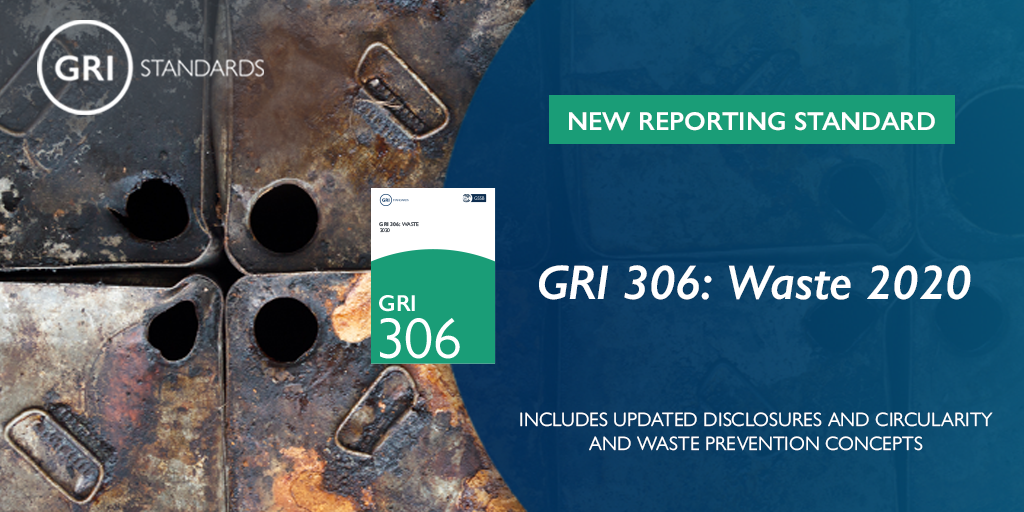No Wasted Opportunities: Enabling Full Disclosure
Launch of sustainability standard to challenge the status quo on waste

May 19, 2020 /3BL Media/ - Organizations now have the means to disclose a complete picture of the waste impacts in their activities, products and services – following the launch of a new reporting standard by GRI, provider of the leading global sustainability standards.
The GRI Waste Standard changes how companies measure and understand waste, responding to global concerns about increases in waste generation and the impact on the environment, society and the economy. It encourages companies to prevent waste at source and unlock opportunities for circular business practices.
GRI 306: Waste 2020, which updates previous GRI disclosures on waste, requires organizations to report on waste generated throughout the value chain, and release detailed information on its composition and how it is managed. Developed by a multi-stakeholder group of experts, it is now freely available as part of the GRI Standards.
Tim Mohin, GRI Chief Executive, said:
“As the disruption to systems and supply chains caused by COVID-19 has shown, companies need to re-think how they do business if they are to be resilient. The time is right – in fact, overdue – for a shift to more sustainable practices. GRI’s new Waste Standard will enable organizations to critically assess waste generation and be a driver for improvement.
This is about fundamentally challenging the perception of waste, from an unwanted residue to a valuable resource. Our Waste Standard supports this by providing universally applicable best practice on managing waste impacts in a way that raises ambition for circularity.”
Judy Kuszewski is chair of the Global Sustainability Standards Board – the independent body responsible for developing and implementing the GRI Standards. She said:
“This is the disclosure standard that the world needs. It reflects the transition from an outdated ‘take, make, waste’ industrial model to one that that designs out waste and minimizes its impacts. The GRI Waste Standard will help any forward-thinking organization demonstrate to stakeholders – such as communities, customers, investors and governments – that they have a holistic and progressive approach to waste.”
Arne Ragossnig of the International Solid Waste Association (former Managing Director and current Editor-in-Chief of Waste Management and Research) said:
“For the first time, the revised GRI Waste Standard allows for indirect waste impacts – upstream and downstream – to be made visible. I am convinced that this broadening of the scope will increase sustainability efforts by reporting businesses, underpinning changes across the value chain with positive effects on how waste is generated and managed.”
Amisha Parekh, Product Manager, Sustainable Finance Solutions at Bloomberg LP, said:
“How businesses manage waste matters to investors, who are increasingly factoring sustainability costs and opportunities into their company assessments and demanding better disclosure. This GRI Standard will help companies demonstrate how they are responding to rising investor and consumer awareness of waste-related issues and prioritizing waste and circularity practices throughout their operations and supply chains.”
Piet Klop, Senior Advisor Responsible Investment, PGGM Investments, added:
“PGGM welcomes GRI’s work to encourage transparency and standardisation around the impact, both positive and negative, that companies have on the Sustainable Development Goals. The Waste Standard will help us to push for more meaningful disclosure as we seek to direct more of our investments to those companies that provide solutions for the reduction, reuse and recycling of waste – as set out in SDG12.”
The GRI Waste Standard updates, expands and replaces GRI 306: Effluents & Waste 2016. The content was developed by a 15-member expert working group and underwent an open public comment period in 2019. A key fact sheet is also available.
GRI has organized two webinars on the Waste Standard and places can be booked now:
- 9 June: A waste standard for the post-pandemic world: How COVID-19 has impacted waste management globally, and role of GRI 306 to enable transparent reporting and stakeholder engagement
- 11 June: Waste reporting – a gateway to the circular transition: Importance of circularity for business resilience and the tools that can help (as provided by GRI, Ellen MacArthur Foundation and WBCSD)
GRI 306: Waste 2020 supports organizations to:
- Understand and publicly report how procurement, design and use of materials lead to waste-related impacts.
- Provide comprehensive insights into the quantity and quality of waste – including its causes, where it is generated and how impacts are managed.
- Identify and report on circularity and waste prevention opportunities and actions.
- Assess and take responsibility for waste generated throughout the value chain, both upstream and downstream.
The Global Reporting Initiative (GRI) is the independent international organization that helps businesses, governments other organizations understand and communicate their impacts.

